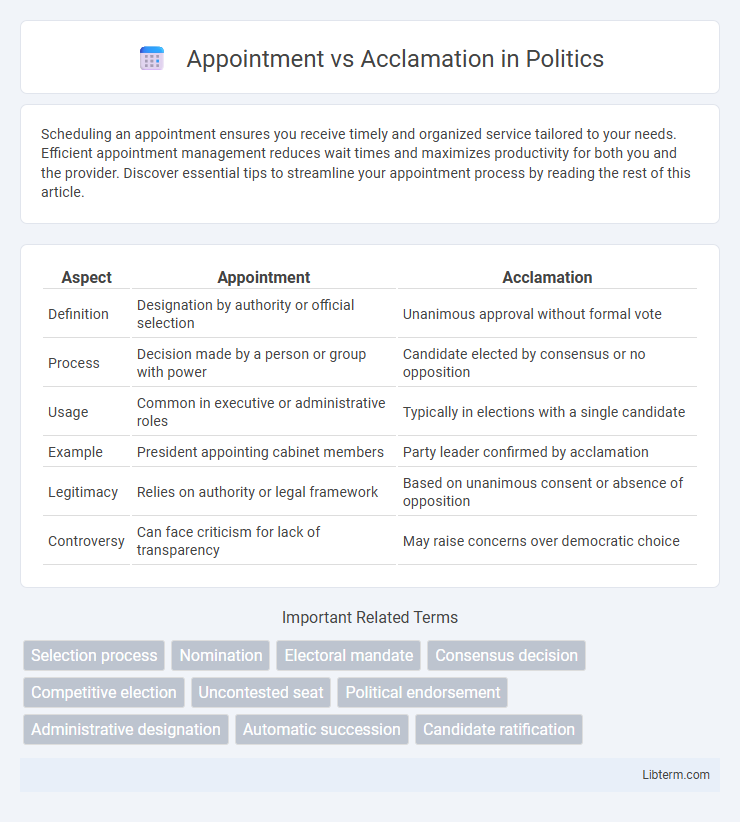Scheduling an appointment ensures you receive timely and organized service tailored to your needs. Efficient appointment management reduces wait times and maximizes productivity for both you and the provider. Discover essential tips to streamline your appointment process by reading the rest of this article.
Table of Comparison
| Aspect | Appointment | Acclamation |
|---|---|---|
| Definition | Designation by authority or official selection | Unanimous approval without formal vote |
| Process | Decision made by a person or group with power | Candidate elected by consensus or no opposition |
| Usage | Common in executive or administrative roles | Typically in elections with a single candidate |
| Example | President appointing cabinet members | Party leader confirmed by acclamation |
| Legitimacy | Relies on authority or legal framework | Based on unanimous consent or absence of opposition |
| Controversy | Can face criticism for lack of transparency | May raise concerns over democratic choice |
Understanding Appointment and Acclamation
Appointment involves selecting an individual to a position through a formal decision-making process, often by an authority or governing body. Acclamation occurs when a candidate is approved unanimously or without opposition, typically demonstrated through vocal agreement or applause in a public setting. Both methods reflect different forms of endorsement, with appointment emphasizing deliberation and acclamation highlighting consensus.
Key Differences Between Appointment and Acclamation
Appointment involves selecting an individual for a position through a formal process usually conducted by an authority or committee, ensuring deliberate evaluation and decision-making. Acclamation occurs when a candidate is chosen unanimously without opposition, often by vocal agreement or consensus in a meeting, reflecting collective support and absence of contest. The key difference lies in appointment requiring a structured decision, while acclamation depends on unanimous, unchallenged approval.
When Is Appointment Used?
Appointment is used when selecting individuals to fill specific positions or roles based on qualifications, expertise, or authority granted by a governing body. It commonly occurs in government, corporate, and organizational contexts where formal procedures dictate the process, such as the appointment of judges, executives, or committee members. This method ensures accountability and adherence to established criteria, distinguishing it from acclamation, which relies on unanimous or popular agreement without formal voting.
Situations Favoring Acclamation
Acclamation is favored in situations where unanimous consent reflects strong consensus, such as uncontested elections or routine decisions within small groups. This method expedites decision-making by avoiding formal voting processes and is often used when the candidate or proposal enjoys overwhelming support. Acclamation is particularly effective in fostering unity and demonstrating collective endorsement in assemblies or organizational meetings.
Pros and Cons of Appointment
Appointment grants organizations control over selecting qualified candidates, ensuring alignment with specific goals and expertise requirements. However, it can reduce transparency and may lead to perceptions of favoritism or reduced legitimacy among stakeholders. The process often bypasses broader participation, potentially limiting diverse viewpoints and acceptance.
Advantages and Disadvantages of Acclamation
Acclamation as a method of selection offers the advantage of rapid consensus without the need for formal voting, which can save time and simplify decision-making in elections or meetings. However, it also carries the risk of suppressing minority opinions and reducing transparency, since decisions are made by vocal approval rather than quantifiable votes. This process may lead to less legitimacy or perceived fairness compared to appointment systems that often involve clear procedures and criteria.
Impact on Organizational Governance
Appointment centralizes decision-making power by enabling designated authorities to select leaders, often ensuring alignment with organizational goals and stability in governance. Acclamation reflects collective consensus, enhancing legitimacy and member engagement but may risk reinforcing established power structures without rigorous evaluation. Both methods influence governance dynamics by balancing control and inclusivity, affecting transparency, accountability, and strategic direction.
Legal and Policy Considerations
Appointment involves a formal, legal process where a designated authority selects an individual based on statutory guidelines, ensuring compliance with governance and transparency standards. Acclamation occurs when a candidate is unopposed and thereby automatically selected, often bypassing competitive procedures but still requiring adherence to organizational bylaws and legal frameworks. Legal considerations include the legitimacy of the selection process, due process rights, and the impact on policy enforcement and institutional accountability.
Case Studies: Appointment vs Acclamation in Practice
Case studies of Appointment vs Acclamation reveal distinct decision-making dynamics across organizational settings, highlighting Appointment's reliance on formal selection processes and Acclamation's emphasis on consensus and unanimous agreement. In corporate boards, Appointment typically ensures diverse expertise through deliberate candidate evaluation, while Acclamation is common in community organizations where trust and group cohesion prevail. Legal and political institutions often prefer Appointment to maintain procedural integrity, whereas Acclamation facilitates swift leadership decisions in less formal environments.
Choosing the Right Method: Factors to Consider
Choosing between appointment and acclamation depends on factors like the organization's size, urgency of filling the position, and the need for consensus or speed. Appointment offers a structured and often formal approach with a clear decision-maker, ideal for complex roles requiring expertise. Acclamation suits smaller groups or informal settings where unanimous agreement can be quickly achieved, promoting unity and swift decision-making.
Appointment Infographic

 libterm.com
libterm.com